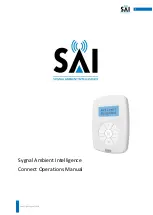
6
Safety Precautions
Make all adjustments to the radio control system with engine not running, or the electric
motor disconnected.
If the engine is running or the motor is connected while adjustments are made, the model
may run out of control.
Remove the main battery source from electric powered models when they are not being
used.
Should you accidentally leave the receiver switch on, the model could run out of control.
(Fail safe function)
Before running (cruising), check the fail safe function.
Check Method:
Before starting the engine, check the fail safe function as follows:
1. Turn on the transmitter and receiver power switches.
2. Turn off the transmitter power switch.
3. Check if the fail safe function moves the servos to the preset position when reception fails.
The fail safe function is a safety feature that minimizes set damage by moving the servos
to a preset position when reception fails. However, if set to a dangerous position, it has the
opposite effect.
Setting example:
Throttle idle or brake position
CAUTION
Do not touch the engine, motor, speed control or any part of the model that will generate
heat while running.
Touching hot parts will result in serious burns.
When the charger is not in use, disconnect it from the outlet. This will prevent accidents,
overheating and short circuits.
Storage and Disposal Safety Precautions
WARNING
At the end of a day's operation, store the system with Ni-Cd/Ni-MH battery discharged. Be
sure to recharge the system before it is used again.
You should fully discharge your system's batteries periodically to prevent a condition called
"memory". For example, if you only make two runs in a day or you regularly use a small
amount of battery's capacity, the memory effect can reduce the actual capacity even if the
battery is charged for the recommended amount of time.
Do not throw a Ni-Cd/Ni-MH battery into a fire. Do not disassemble or attempt to repair a
Ni-Cd/Ni-MH battery pack.
Overheating, damage and acid leakage may lead to burns, loss of eye sight as well as nu-
merous other types of injuries. The electrolyte in Ni-Cd/Ni-MH batteries is a strong alkali.
Should you get even the smallest amount of the electrolyte in your eyes, Do Not rub. Wash
immediately with water, and seek medical attention at once. The electrolyte can cause
blindness. If electrolyte comes in contact with your skin or clothes, wash with water immedi-
ately.






































